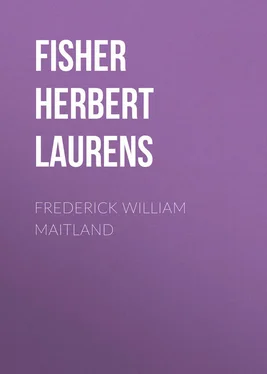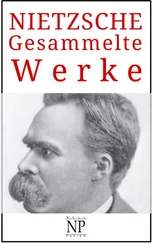Herbert Fisher - Frederick William Maitland
Здесь есть возможность читать онлайн «Herbert Fisher - Frederick William Maitland» — ознакомительный отрывок электронной книги совершенно бесплатно, а после прочтения отрывка купить полную версию. В некоторых случаях можно слушать аудио, скачать через торрент в формате fb2 и присутствует краткое содержание. Жанр: foreign_antique, foreign_prose, на английском языке. Описание произведения, (предисловие) а так же отзывы посетителей доступны на портале библиотеки ЛибКат.
- Название:Frederick William Maitland
- Автор:
- Жанр:
- Год:неизвестен
- ISBN:нет данных
- Рейтинг книги:4 / 5. Голосов: 1
-
Избранное:Добавить в избранное
- Отзывы:
-
Ваша оценка:
- 80
- 1
- 2
- 3
- 4
- 5
Frederick William Maitland: краткое содержание, описание и аннотация
Предлагаем к чтению аннотацию, описание, краткое содержание или предисловие (зависит от того, что написал сам автор книги «Frederick William Maitland»). Если вы не нашли необходимую информацию о книге — напишите в комментариях, мы постараемся отыскать её.
Frederick William Maitland — читать онлайн ознакомительный отрывок
Ниже представлен текст книги, разбитый по страницам. Система сохранения места последней прочитанной страницы, позволяет с удобством читать онлайн бесплатно книгу «Frederick William Maitland», без необходимости каждый раз заново искать на чём Вы остановились. Поставьте закладку, и сможете в любой момент перейти на страницу, на которой закончили чтение.
Интервал:
Закладка:
Maitland's Fellowship dissertation entitled "A Historical Sketch of Liberty and Equality as Ideals of English Political Philosophy from the time of Hobbes to the time of Coleridge" is, despite some defects of proportion, a remarkable performance for so young a man. Not only does it cover a wide range of reading, especially in the English moralists, but it is distinguished by two characteristic qualities – independence of judgment and a scrupulous estimate of the canons of proof. The scholar of Trinity says many good things 7 7 Such for instance as: — "The love of simplicity has done vast harm to English Political Philosophy." "No history of the British Constitution would be complete which did not point out how much its growth has been affected by ideas derived from Aristotle." "The idea of a social compact did not become really active till it was allied with the doctrine that all men are equal." "In Hume we see the first beginnings of a scientific use of History."
, but says nothing at random. Even when it would have been tempting to sally forth with a flourish of affirmation, he prefers to stand within the zone of caution. "I am inclined to think," he writes, "(though there is great risk of such speculations being wrong) that Hobbes was led to exaggerate his account of man's naturally unsocial character by a desire to bring the state of nature into discredit." One cannot dogmatise about the motives of the dead; our dogmas are but plausible hypotheses, and so complex is human nature, so inexhaustible is life's casuistry that the likeliest conjecture may fail of the mark. "There is a great risk of such speculation being wrong." Touches like this reveal the fact that the disciple of Sidgwick had learnt his master's lesson.
The scholarship at Trinity, carrying with it a place at the scholar's table, brought Maitland into communion with the ablest men in the College. It often happens that a youth who has attracted little attention at school by reason of his failure to satisfy the limited conventions of schoolboy excellence, springs into sudden prominence at the University. His conversation attracts notice; his friends discover that he has original opinions, or some peculiar charm of bearing, or that his gifts of mind or character are out of the common. So it was with Maitland. He soon achieved a reputation not only as a witty and brilliant talker, but as a charming companion and as the most original public speaker of his time. He was elected to be a member of the Apostles, a small society which for many university generations has been a bond between clever young Cambridge men and has brought them into friendly relations with their seniors: and by the suffrages of a larger and less select electorate he rose to be Secretary and then President of the Union Society.
Maitland's speeches at the Union printed themselves upon the minds of his audience as being very effective for their immediate purpose and yet quite unlike the speeches of ordinary vote-winners. His artifice was all his own. Others were more eloquent, more prompt in the cut and thrust of debate, but in the power of condensing an argument into a surprising phrase or epigram he stood alone. After his first successful appearance as the advocate of the opening of National Collections of Science and Art on Sunday afternoons he became the favourite undergraduate orator of his time. "You insist that we must keep the Mosaic Law," he argued in his maiden speech, "but under it a man who gathered sticks on the Sabbath was stoned to death. Now I have picked up sticks on Sundays. Will you in your consistency stone me?" On another occasion he delighted the House by observing that at the Reformation the English State put an end to its Roman bride but married its deceased wife's sister. The shape of his opinions was frankly radical and fashioned by a vehement enthusiasm for free thinking and plain speaking. "There are two things," he remarked, "which we have learnt by costly experience that the Law cannot control – Religious Belief and the Rate of Interest." Compulsory attendance at College Chapel, Church Establishment, the closing of the Cambridge Union on Sunday mornings aroused his opposition and furnished the theme of well-remembered speeches. "O Sir," he once exclaimed to the President with outstretched hands, "I would I were a vested nuisance! Then I should be sure of being protected by the whole British Public."
There is a pleasant story contributed by Professor Kenny – to whom this portion of the narrative is greatly indebted – of a debate upon a motion that certain annotations upon the annual report of the Union's proceedings should be cancelled in the interests of "the literary credit of the Society." The notes were ungrammatical, ludicrous, unauthorised. They had been composed during the Long Vacation by the Society's senior servant in the name of the absent Secretary. There was nothing to be said for them save that it was hard that a good old man should be humiliated for an excess of official zeal. Maitland was Secretary at the time and chivalrously undertook the defence of his subordinate. It was the eve of the Fifth of November; the name of the mover was James. Such an historical coincidence was not lost upon the ingenious mind of the Secretary. "Tomorrow," he observed, boldly carrying the war into the enemy's country, "is the Feast of the Blessed Saint Guy. Appropriately enough the House appears to be under search this evening for indications of a new plot. Enter King James the Third, surrounded by his minions, with a loud flourish of his own trumpet. He produces the dark lantern of his intellect and discovers – not a conspirator, but a mare's nest." And when, at last, by successive strokes of humour Maitland had won over the sympathies of the House, he proceeded to venture upon the merits of his defence. "We are attacked," he said, "for bad grammar. A great crime, no doubt, in some men's eyes. For at times I have met men to whom words were everything, and whose everything was words; men undistinguished by any other capacity, and unknown outside this House, but reigning here in self-satisfaction, lords of the realm of Tautology."
II
The failure to obtain a fellowship broke off any design which may have been entertained of an academic career, and Maitland, following the family example, returned to London to try his fortune at the bar. Men of high academic achievement sometimes fail in the practical professions, by reason of a certain abstract habit of mind or from an engrained unsociability of temperament. Neither of these disadvantages affected Maitland. A combined training in philosophy and law had given him just that capacity for deriving principles from the facts of experience, and of using the facts of experience as the touchstone of principles, which is essential to the adroit and intelligent use of legal science; and for all his learning and zeal there was nothing harsh and unsocial about him. On the other hand he was completely deficient in the moral alloy which appears to be an essential element in the fabric of most successful careers. He was entirely destitute of the arts of "push" or advertisement, and so disinterested and self-effacing that a world which is accustomed to take men at their own valuation was not likely to seize his measure.
Maitland entered at Lincoln's Inn in 1872 and was called to the bar in 1876, reading first with Mr Upton and afterwards with Mr B. B. Rogers, the brilliant translator and editor of Aristophanes. "I had only one vacancy," writes Mr Rogers, "in my pupil room and that was about to be filled by a very distinguished young Cambridge scholar. But he was anxious – stipulated I think – that I should also take his friend Maitland. I did not much like doing so, for I considered four pupils as many as I could properly take, and I knew nothing of Maitland and supposed that he would prove the crude and awkward person that a new pupil usually is, however capable he may be, and however distinguished he may become in later life. However, I agreed to take him as a fifth pupil, and he had not been with me a week before I found that I had in my chambers such a lawyer as I had never met before. I have forgotten, if I ever knew, where and how he acquired his mastery of law; he certainly did not acquire it in my chambers: he was a consummate lawyer when he entered them. Every opinion that he gave was a complete legal essay, starting from first principles, showing how the question agreed with one, and disagreed with another, series of decisions and finally coming to a conclusion with the clearest grasp of legal points and the utmost lucidity of expression. I may add (and though this is a small point it is of importance in a barrister's chambers) that it was given in a handwriting which it was always a pleasure to read. He must have left me in 1877, and towards the end of 1879, my health being in a somewhat precarious state, and my medical advisers insisting on my lessening the strain of my work, I at once asked Maitland to come in and superintend my business. He gave up his own chambers and took a seat in mine (the chambers in 3 Stone Buildings where I then was are I think the largest in the Inn), superintended the whole of my business, managed my pupils, saw my clients and in case of necessity held my briefs in Court. I doubt if he would have succeeded as a barrister; all the time that I knew him he was the most retiring and diffident man I ever knew; not the least shy or awkward; his manners were always easy and self-possessed; but he was the last man to put himself forward in any way. But his opinions, had he suddenly been made a judge, would have been an honour to the Bench. One of them may still be read in Re Cope Law Rep. 16 Ch. D. 49. There a long and learned argument filling nearly two pages of the Report is put into the mouth of Chitty Q.C. and myself, not one word of which was ever spoken by either of us . It was an opinion of Maitland's on the case laid before us which I gave to Chitty to assist him in his argument… I cannot close this long though hastily written letter without expressing my personal esteem for the man. Wholly without conceit or affectation, simple, generous and courteous to everybody, he was the pleasantest companion that anybody could ever wish for: and I think that the three years he spent in my chambers were the most delightful three years I ever spent at the bar."
Читать дальшеИнтервал:
Закладка:
Похожие книги на «Frederick William Maitland»
Представляем Вашему вниманию похожие книги на «Frederick William Maitland» списком для выбора. Мы отобрали схожую по названию и смыслу литературу в надежде предоставить читателям больше вариантов отыскать новые, интересные, ещё непрочитанные произведения.
Обсуждение, отзывы о книге «Frederick William Maitland» и просто собственные мнения читателей. Оставьте ваши комментарии, напишите, что Вы думаете о произведении, его смысле или главных героях. Укажите что конкретно понравилось, а что нет, и почему Вы так считаете.












